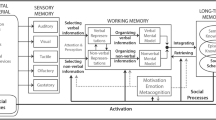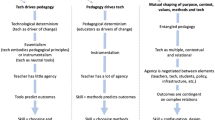Abstract
The aim of the article is to theoretically develop a notion of digital Bildung that accepts the “world” of today as characterised by the entanglement of humans and technology. I draw on Adorno’s critical notion of Bildung, Luciano Floridi’s and Katherine Hayles’ respective understandings of the human-technology entanglement, and the social philosophy of the American philosopher Robert Brandom to understand Bildung as a piecemeal process. Nevertheless, Bildung is a rational process of making explicit the implicit connections to which we commit ourselves by being entangled in a tech–non-tech world. The article contributes to delineating a theoretical notion of digital Bildung that accepts and develops Bildung as critically precipitating from within this entanglement—what Brandom terms a semantic self-consciousness.
Similar content being viewed by others
Notes
In what follows, I will assume that Bildung means digital Bildung. So reference to technology, unless otherwise stated, means digital technology.
I am thinking here of the case of ofqual. See British Government (2020).
This would need to take the whole discussion of philosophical naturalism into consideration, and given our non-determinist and non-reductionist point of departure, Rouse (2015) would be a good place to start.
References
Aagaard, Johannes. 2021. The care of our hybrid selves: towards concept of Bildung for digital times. Journal of Philosophy of Education 55 (1): 41–54.
Adorno, Theodor Wiesengrund. 2006. Theorie der Halbbildung. Frankfurt am Main: Suhrkamp Verlag.
Berlin, Isiah. 1976. Vico and Herder: two studies in the history of ideas. New York: Viking Press.
Biesta, G. 2010. Why “what works” still won’t work: from evidence-based education to value-based education. Studies in Philosophy and Education 29 (5): 491–503. https://doi.org/10.1007/s11217-010-9191-x.
Bostrom, Nick. 2005. A history of transhumanist thought. Journal of evolution and technology, 14(1).
Brandom, Robert. 1994. Making it explicit: reasoning, representing, and discursive commitment. Harvard University Press.
Brandom, Robert. 2000. Articulating reasons. (AR): Harvard University Press.
Chimirri, Niklas, and Ernst Schraube Alexander. 2019. Rethinking psychology of technology for future society: exploring subjectivity from within more-than-human everyday life. Psychological studies of Science and Technology, eds. Kieran C. O’Doherty, Lisa M. Osbeck, Ernst Schraube, Jeffery Yen, 49–76. Cham: Palgrave Macmillan.
Christensen, Bo Allesøe. 2021. Valsiner on facts: Making culture explicit?. In Culture as process, eds. Brady Wagoner, Christensen, Bo Allesøe, Demuth Carolin, 379–388. Cham: Springer.
Clark, Andy, and David Chalmers. 1998. The extended mind. Analysis 58 (1): 7–19.
Derry, Jan. 2008. Abstract rationality in education: from Vygotsky to Brandom. Studies in Philosophy and Education 27: 49–62.
Dunne, Anthony. 2008. Hertzian tales: electronic products, aesthetic experience, and critical design. Cambridge: MIT press.
Fawns, Tim. 2022. An entangled pedagogy: looking beyond the pedagogy-technology dichotomy. Postdigital Science and education 4: 711–728.
Floridi, Luciano. 2013. The philosophy of information. Oxford: OUP.
Floridi, Luciano. 2014. The fourth revolution: how the infosphere is reshaping human reality. Oxford: OUP.
Haraway, Donna. 1991. A cyborg manifesto: Science, technology, and socialist-feminism in the late twentieth century. In Simians, cyborgs and women: the reinvention of nature, ed. Donna Haraway, 149–181. New York: Routledge.
Hayles, Nancy Katherine. 2016. The cognitive nonconscious: enlarging the mind of the humanities. Critical Inquiry 42 (4): 783–808.
Hayles, Nancy Katherine. 2020. Unthought. Chicago: University of Chicago Press.
Herdt, Jennifer. 2019. Forming humanity: redeeming the german bildung tradition. Chicago: University of Chicago Press.
Rheingold, Howard. 2012. Net smart: how to thrive online. Cambridge: MIT Press.
Ingold, Tim. 2017. Anthropology and/as education. London: Routledge.
Riis, Søren. 2017a. ICT literacy: an imperative of the Twenty-First Century. Foundations of Science. 22(2): 385–394.
Riis, Søren. 2017b. Information and Communication Technology Inside Out. From Hype to Literacy. Foundations of Science 22(2): 405–409.
Rouse, Joseph. 2015. Articulating the world. Chicago: University of Chicago Press.
Schraube, Ernst, Athanasios Marvakis. 2015. Frozen fluidity: Digital technologies and the transformation of students’ learning and conduct of everyday life. In Psychology and the conduct of everyday life, 205–225. London: Routledge. Charlotte: eds. Ernst Schraube, Højholt.
Smith, Nicholas Hugh. 2010. Expressivism in Brandom and Taylor. In Postanalytic and Metacontinental: Crossing Philosophical Divides, eds. Reynolds, Jack, James Chase, James Williams and Edwin Mares, 145–156. London: Continuum.
Taylor, Charles. 1979. Action as expression. In Intention and Intentionality, eds. Diamond, Cora and Jenny Teichmann, 73–90. Ithaca: Cornell University Press.
Taylor, Charles. 1989. Sources of the self. Cambridge: Cambridge university Press.
Thompson, Christiane. 2006. Adorno and the borders of experience: the significance of the nonidentical for a “different” theory of Bildung. Educational Theory 56 (1): 69–87.
Vlieghe, Joris. 2017. ICT literacy: a technical or non-technical issue? Foundations of Science 22(2): 401–404.
Williams, Jeffrey. 2013. Inferential man: an interview with Robert Brandom. Symploké 21 (1–2): 373–397.
Author information
Authors and Affiliations
Corresponding author
Additional information
Publisher’s Note
Springer Nature remains neutral with regard to jurisdictional claims in published maps and institutional affiliations.
Rights and permissions
Springer Nature or its licensor (e.g. a society or other partner) holds exclusive rights to this article under a publishing agreement with the author(s) or other rightsholder(s); author self-archiving of the accepted manuscript version of this article is solely governed by the terms of such publishing agreement and applicable law.
About this article
Cite this article
Christensen, B.A. On Digital Bildung: Raising a Critical Awareness of Digital Matters. Stud Philos Educ 42, 303–322 (2023). https://doi.org/10.1007/s11217-023-09870-y
Accepted:
Published:
Issue Date:
DOI: https://doi.org/10.1007/s11217-023-09870-y




